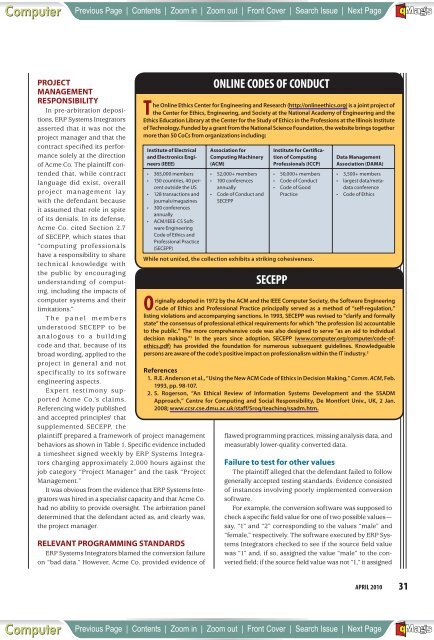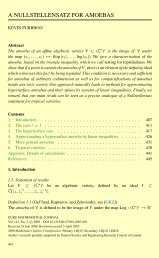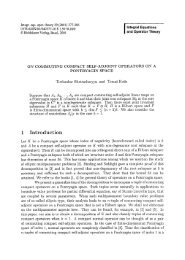computing lives - FTP Directory Listing
computing lives - FTP Directory Listing
computing lives - FTP Directory Listing
You also want an ePaper? Increase the reach of your titles
YUMPU automatically turns print PDFs into web optimized ePapers that Google loves.
A<br />
Computer Previous Page | Contents | Zoom in | Zoom out | Front Cover | Search Issue | Next Page M S BE<br />
aG<br />
F<br />
PROJECT<br />
MANAGEMENT<br />
RESPONSIBILITY<br />
In pre-arbitration depositions,<br />
ERP Systems Integrators<br />
asserted that it was not the<br />
project manager and that the<br />
contract specified its performance<br />
solely at the direction<br />
of Acme Co. The plaintiff contended<br />
that, while contract<br />
language did exist, overall<br />
project management lay<br />
with the defendant because<br />
it assumed that role in spite<br />
of its denials. In its defense,<br />
Acme Co. cited Section 2.7<br />
of SECEPP, which states that<br />
“<strong>computing</strong> professionals<br />
have a responsibility to share<br />
technical knowledge with<br />
the public by encouraging<br />
understanding of <strong>computing</strong>,<br />
including the impacts of<br />
computer systems and their<br />
limitations.”<br />
The panel members<br />
understood SECEPP to be<br />
analogous to a building<br />
code and that, because of its<br />
broad wording, applied to the<br />
project in general and not<br />
specifically to its software<br />
engineering aspects.<br />
Expert testimony supported<br />
Acme Co.’s claims.<br />
Referencing widely published<br />
and accepted principles 1 that<br />
supplemented SECEPP, the<br />
plaintiff prepared a framework of project management<br />
behaviors as shown in Table 1. Specific evidence included<br />
a timesheet signed weekly by ERP Systems Integrators<br />
charging approximately 2,000 hours against the<br />
job category “Project Manager” and the task “Project<br />
Management.”<br />
It was obvious from the evidence that ERP Systems Integrators<br />
was hired in a specialist capacity and that Acme Co.<br />
had no ability to provide oversight. The arbitration panel<br />
determined that the defendant acted as, and clearly was,<br />
the project manager.<br />
RELEVANT PROGRAMMING STANDARDS<br />
ERP Systems Integrators blamed the conversion failure<br />
on “bad data.” However, Acme Co. provided evidence of<br />
ONLINE CODES OF CONDUCT<br />
The Online Ethics Center for Engineering and Research (http://onlineethics.org) is a joint project of<br />
the Center for Ethics, Engineering, and Society at the National Academy of Engineering and the<br />
Ethics Education Library at the Center for the Study of Ethics in the Professions at the Illinois Institute<br />
of Technology. Funded by a grant from the National Science Foundation, the website brings together<br />
more than 50 CoCs from organizations including:<br />
Institute of Electrical<br />
and Electronics Engineers<br />
(IEEE)<br />
<br />
-<br />
<br />
<br />
<br />
<br />
<br />
-<br />
<br />
<br />
<br />
<br />
Association for<br />
Computing Machinery<br />
(ACM)<br />
<br />
<br />
<br />
<br />
<br />
Institute for Certification<br />
of Computing<br />
Professionals (ICCP)<br />
<br />
<br />
<br />
<br />
While not uničed, the collection exhibits a striking cohesiveness.<br />
SECEPP<br />
Data Management<br />
Association (DAMA)<br />
<br />
-<br />
<br />
<br />
Originally adopted in 1972 by the ACM and the IEEE Computer Society, the Software Engineering<br />
Code of Ethics and Professional Practice principally served as a method of “self-regulation,”<br />
listing violations and accompanying sanctions. In 1993, SECEPP was revised to “clarify and formally<br />
state” the consensus of professional ethical requirements for which “the profession (is) accountable<br />
to the public.” The more comprehensive code was also designed to serve “as an aid to individual<br />
decision making.” 1 In the years since adoption, SECEPP (www.computer.org/computer/code-ofethics.pdf)<br />
has provided the foundation for numerous subsequent guidelines. Knowledgeable<br />
persons are aware of the code’s positive impact on professionalism within the IT industry. 2<br />
______________________<br />
______<br />
References<br />
1. R.E. Anderson et al., “Using the New ACM Code of Ethics in Decision Making,” Comm. ACM, Feb.<br />
1993, pp. 98-107.<br />
2. S. Rogerson, “An Ethical Review of Information Systems Development and the SSADM<br />
Approach,” Centre for Computing and Social Responsibility, De Montfort Univ., UK, 2 Jan.<br />
2008; www.ccsr.cse.dmu.ac.uk/staff/Srog/teaching/ssadm.htm.<br />
flawed programming practices, missing analysis data, and<br />
measurably lower-quality converted data.<br />
Failure to test for other values<br />
The plaintiff alleged that the defendant failed to follow<br />
generally accepted testing standards. Evidence consisted<br />
of instances involving poorly implemented conversion<br />
software.<br />
For example, the conversion software was supposed to<br />
check a specific field value for one of two possible values—<br />
say, “1” and “2” corresponding to the values “male” and<br />
“female,” respectively. The software executed by ERP Systems<br />
Integrators checked to see if the source field value<br />
was “1” and, if so, assigned the value “male” to the converted<br />
field; if the source field value was not “1,” it assigned<br />
APRIL 2010<br />
A<br />
Computer Previous Page | Contents | Zoom in | Zoom out | Front Cover | Search Issue | Next Page M S BE<br />
aG<br />
F<br />
31

















